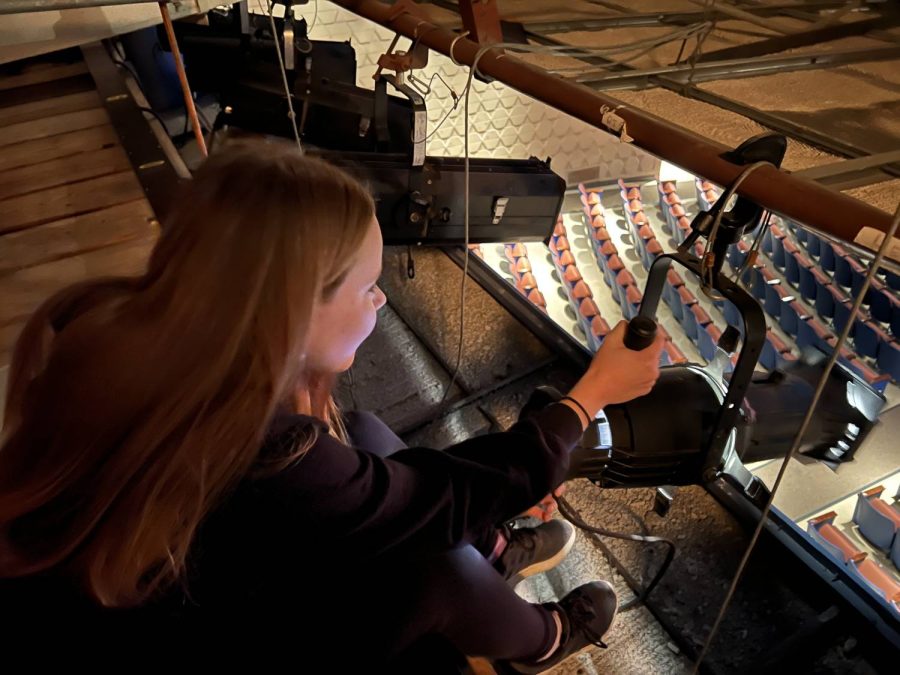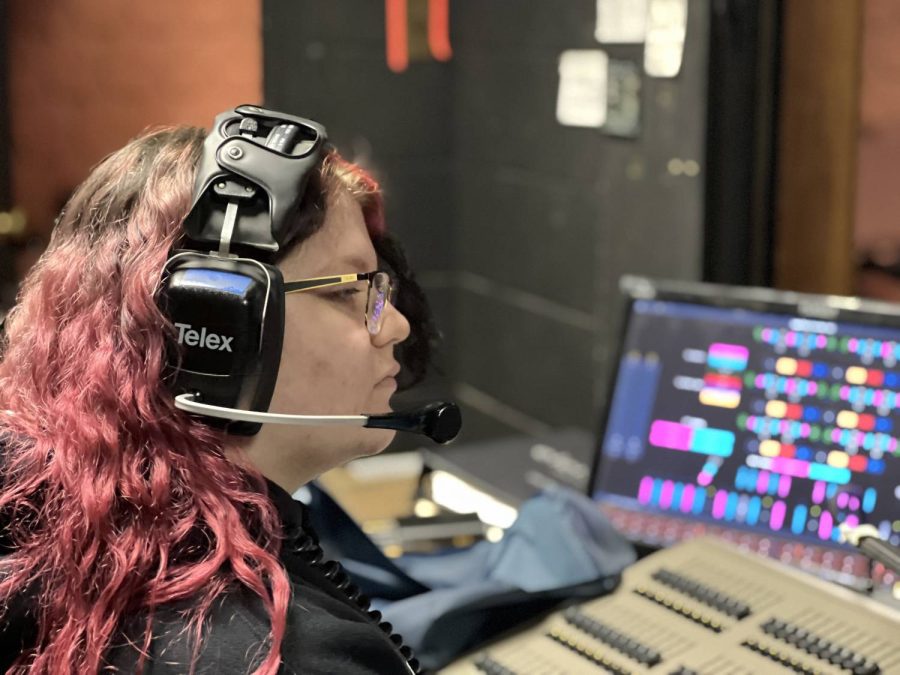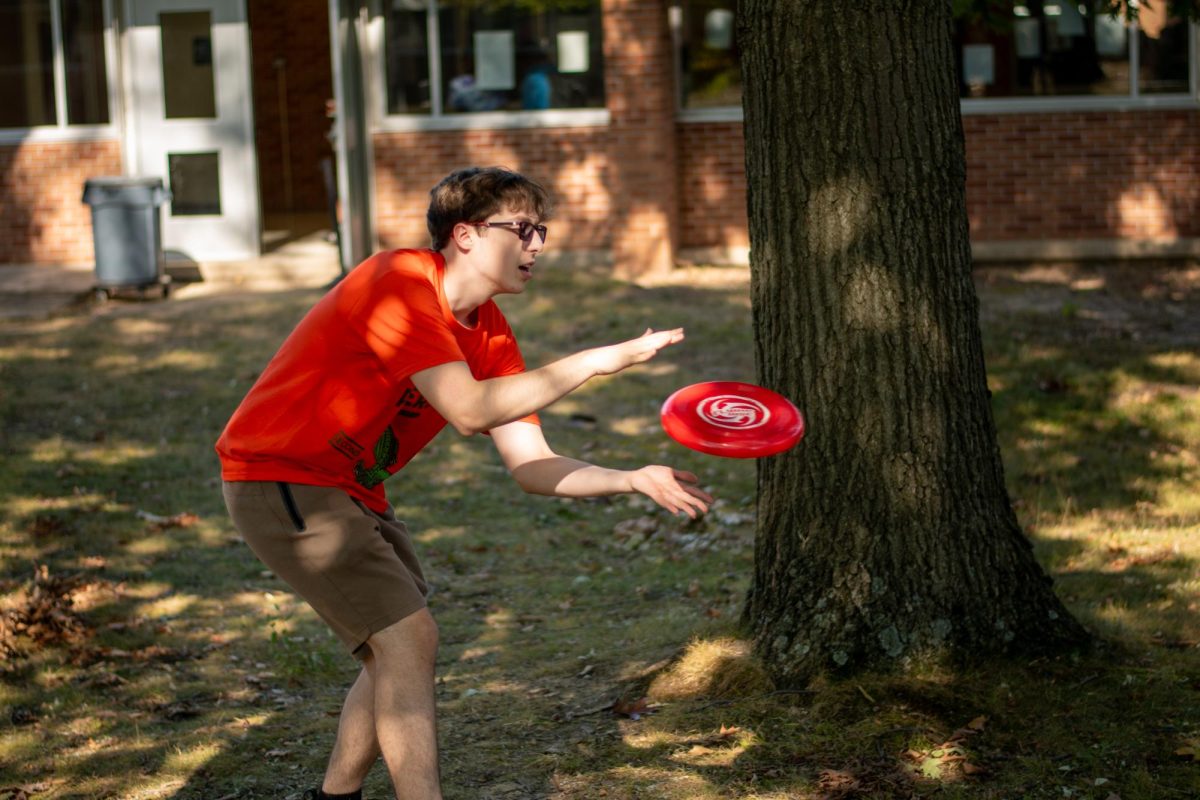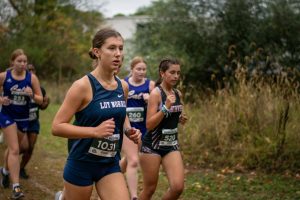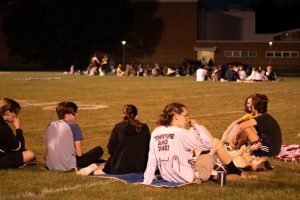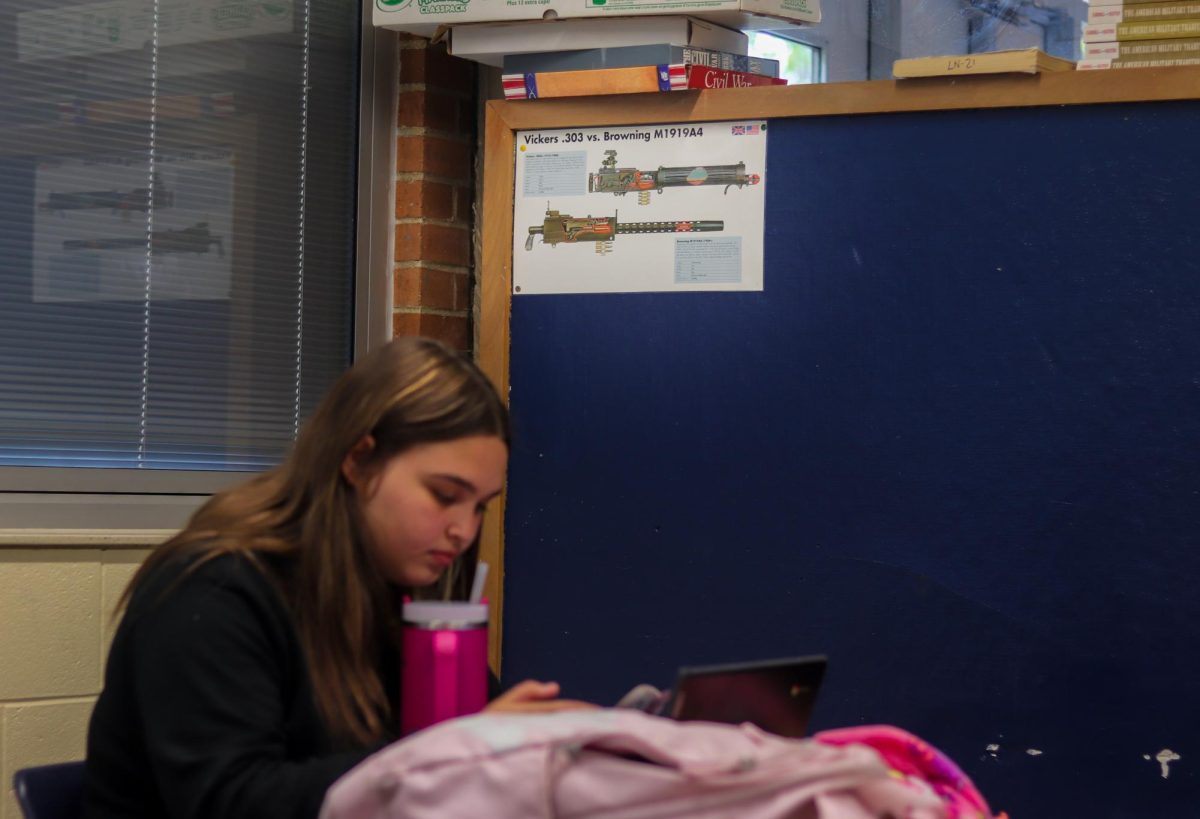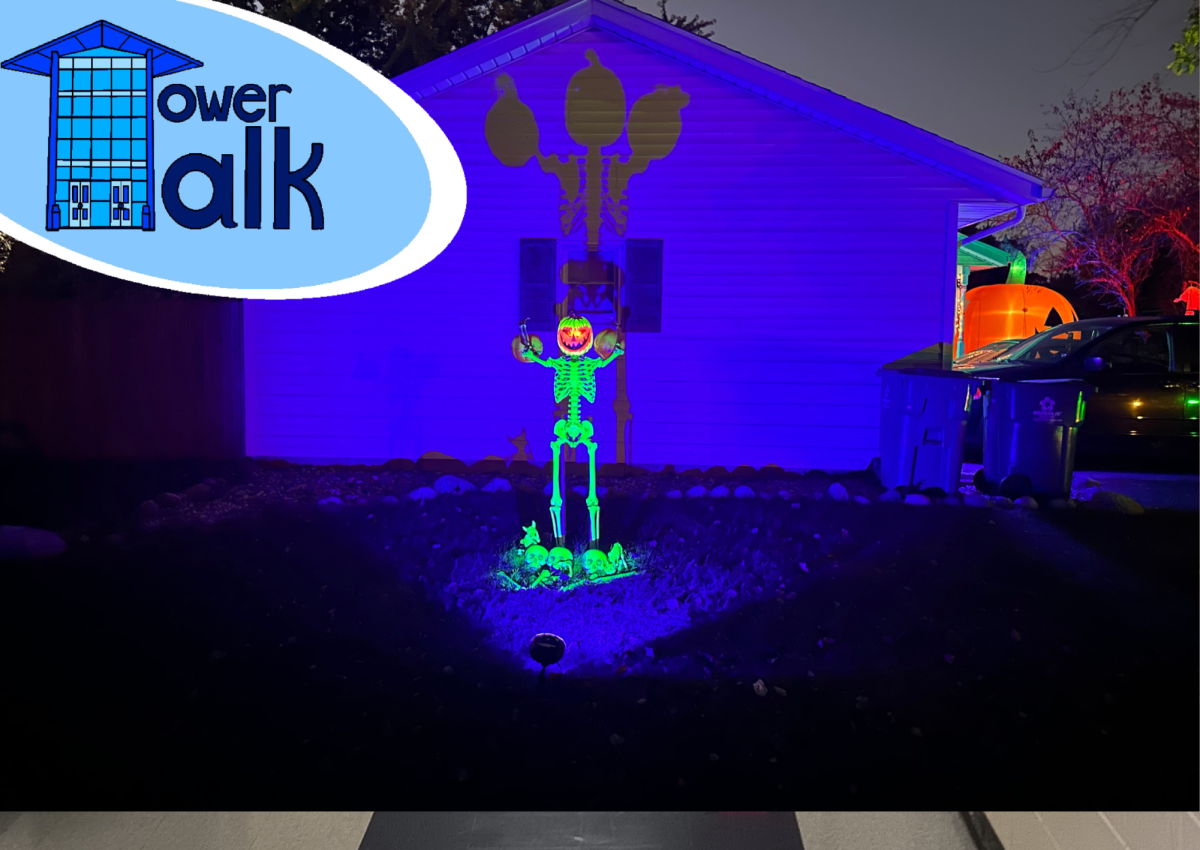Q&A with the students behind the production of “Legally Blonde”
Junior Emma Doren positioning her spotlight before the show opens. During the show, it was her responsibility to track the actors with her light as they moved across the stage.
January 9, 2023
Since September, the crew of “Legally Blonde: The Musical” has been working hard to put on the show. Rehearsals consistently lasted past 10 p.m., but by opening night, the crew was able to work with the actors and everyone else involved to put on a successful show that earned glowing reviews from audience members.
“I think we’ve done a very good job,” junior Nina Holm said, “There’ve been a few mess-ups, but mostly things that I don’t think people in the audience would notice — just that I would notice since I’ve been doing it for three months.”
Holm was one of two assistant stage managers this year. She’s been working backstage since middle school and has experience with running spotlights, set building and being a stagehand.
Junior Emma Doren, who worked with spotlights for “Legally Blonde,” also had concerns about the show.
“As a spotlight, I was worried about losing focus and messing it up, but I was also worried for the actors a little bit — that they were going to forget their lines or mess them up, but it went well,” Doren said.
As much as the rest of the crew was stressed, however, seniors Meg Elfring and Mara Vander Beek experienced much more pressure to make the show perfect for opening night and the rest of the performances.
As stage managers, it was their job to make sure that the show ran smoothly by the time it opened. Calling cues for lights, sound, and curtains were all tasks Elfring and Vander Beek had during the shows. During rehearsals, they were the ones who had to work with actors to memorize their lines, cues, and choreography.
Although both stage managers were concerned initially about the musical being ready, once the first few performances had passed, Elfring and Vander Beek were able to step back and see how all of the work they had done finally came together.
Q: How long have you been part of the crew?
Elfring: Since sixth grade, that was when I did my first show.
Vander Beek: So the first show I ever did was my freshman year. I was just a stagehand for the musical “Pippin,” and ever since then I’ve been doing different types of stuff. And then I started stage managing last year for “Something Rotten.” I did a little bit of it freshman year, but it was more just learning about it. But my junior year [last year], I really started doing stage management.
Q: What kind of experience was necessary for you to be a stage manager?
Elfring: Definitely experience with crew and not just any one specifically, but knowing a lot of different crews and the way they fit together. Also, a lot of it is personality. You need to be confident enough to lead a group of peers, but be able to work with them and be their friend while also being in charge.
Vander Beek: A lot of leadership… so being able to talk to people and let them know what they need to do, but also being respectful about it. And it can be hard because it’s your peers. This year I’m a senior so it’s easier, but in the past I would have to tell people who are older than me what to do and that was intimidating. But lots of problem solving, thinking on your feet, and a lot of teamwork.
Q: What’s your favorite show you’ve ever been a part of?
Elfring: So my first show that I did run crew for was “Beauty and the Beast Jr.” at the Civic, and that was a really great one. I’ve loved the shows we’ve done [at Norrix] and I really enjoyed both of those, but it’s just different. So I’d say “Beauty and the Beast,” “Something Rotten” or “Legally Blonde.”
Vander Beek: I really like “Legally Blonde.” I think it’s really fun and there’s a lot of cool people. It’s a little crazy because there’s so many moving parts, so that’s been fun to figure out but also kinda stressful. We have a really good crew this year, and I really like the people that are on it and the entire directing staff has been super good this year.
Q: For “Legally Blonde” specifically, what are you most proud of?
Elfring: I think just the way that it ended up coming together because there was a long time when we were like “this isn’t gonna work, we aren’t gonna be able to put this on the way we want to,” and there were so many issues from set and lighting and all of the technical elements, which are the parts I pride myself on.
Vander Beek: I think that we were able to put it on: it just happened. I was proud that it came together. And just hearing how excited people are about it, and being able to put something on that makes people happy.
Q: What’s the most difficult part of your job?
Elfring: I think the long hours because I want to make every part of it the best it can be. That ends up with [me] getting burnt out really easily and spending more time than anyone else [at the school], except maybe Mr. Lafferty [the director] because when stuff goes wrong I take it on myself to try to fix it. So there were a few times where I was really struggling with that and needed to learn how to set boundaries.
Vander Beek: Everything… It’s really difficult. I would say that logistically, just dance numbers in general are really hard for us. So we have to write down every step a character does, so like when they cross to this stage or when they do a certain move. Also Mr. Lafferty thinks of a lot of crazy ideas, so being able to have both the crazy great ideas and the realistic stuff that we’re able to do.
Q: What’s your favorite part?
Elfring: I love being a part of the whole process. I love getting to see it from start to finish and getting to know these kids that I never would’ve known if I hadn’t done this. Also, you’re treated like a peer by the other adults.
Vander Beek: The people. I love the people — both cast and crew. They’re amazing. They’re really friendly, and in the past there’s been this kind of separation between cast and crew, but I feel like this year it’s been really close with everyone, so that’s been super nice. It’s nice to meet new people that I wouldn’t otherwise hang out with, and I’ve made a lot of really great, really close friends.
Q: How do you balance schoolwork, your home life, and the musical during Tech Week?
Tech Week is the week leading up to the first few performances. It’s the busiest time for everyone involved in the musical, as rehearsals are daily and last much longer than usual. The entire show is run through so that any problems can be worked out before the opening night.
Elfring: You don’t. I have no life outside of the musical right now. If I can get all of my homework done during school hours, great, but I’ll do what I have to to get it done. It’s definitely taken a back seat compared to the show, which I know isn’t the most healthy thing and what I’m relying on is the fact that it’s like two weeks of intensity, and then I can go back to focusing on other stuff. But yeah, there’s not really a balance.
Vander Beek: Not great whatsoever. The biggest thing is communicating with my teachers, which I’m not fully great at, to be honest, but just letting them know I’m super busy. I’m at the school for hours and hours and hours on end working on stuff, but honestly it’s really about scheduling and making sure that I have time set aside. And sometimes I stay up really late and do it. Or — my teachers are gonna hate that I say this — but I just do it right before class or stuff like that. It’s not great, but I do it.
Q: What does the general process of a rehearsal look like?
Elfring: So we start out learning everything, and we try to do that as quick as possible. I think it was like maybe 4 weeks of learning stuff. I know that doesn’t sound fast, but every day it’ll sometimes start with singing, sometimes starting with dancing. Different groups would be doing different things at different times, so like a group of Harvard students might be blocking stuff while the Delta Nu students are dancing. We spend the first couple weeks learning, and after that it becomes running things over and over again. It’s not really until a week before that we can get through the whole show in one rehearsal. Our rehearsals are generally supposed to be three hours long, and there are days when we weren’t sure if we were going to finish the entire first act in that time because there’s so much stopping and figuring things out.
Q: Anything else to add?
Elfring: Being a stage manager is a very fulfilling job, and it’s something that I really enjoy. It’s easy to kind of just talk about all of the difficult things, but to see people after the show on Friday just astonished at it and really enjoying it reminds us why we do this. And as someone who doesn’t like to act, I really liked doing this.
“Legally Blonde” is now long over, but there will still be opportunities to be involved in the Loy Norrix theater program later in the year with “Almost Maine.” Auditions for actors have already passed, but the crew is still looking for help. If you’re interested in working backstage with the crew, contact drama teacher Dan Lafferty in J11. Once a date for the first crew meeting has been established, it will be featured on the morning announcements.


